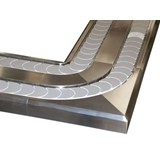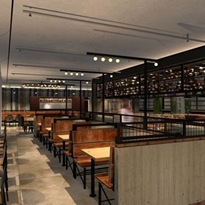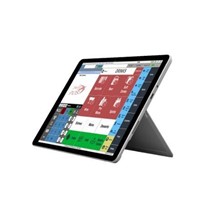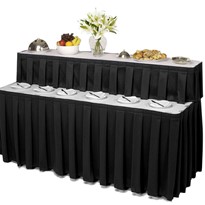There has been a boom in online ordering and cloud kitchens. This has forced people in the industry to look seriously at cost models and improving efficiencies. With third party online platforms taking up to 30% commissions on orders, there has also been big downward pressure on profit.
Add to this upward pressure on power, gas and staff costs as well as difficulty finding experienced people to work and run these businesses and you have an extremely volatile market.
Plus, with the popularity of cooking shows, there are now bigger than ever expectations from consumers to provide high quality food - even in casual dining environments.
As a result of this, restaurant and catering business owners are pulled in multiple directions trying to micromanage multiple parts of the business to simply keep everything together.
There has never been a more important time for restaurant and catering business owners to optimize their systems, supply chains and cost models as there is right now.
What to expect in this report
In this report, we will be covering the biggest mistakes restaurant and catering business owners make in their businesses which cause them to lose precious profit plus give you some simple solutions to these problems.
It is our aim to provide some insights into how to make your business more profitable and efficient so you can focus more on the things that really count in hospitality.
1. Leaving kitchenware purchases to the last minute
Because restaurant and catering business owners are so busy, they often miss opportunities to optimise quality and preferential pricing because of poor planning. Ordering on an “as needed” basis can often cause delays in supply and often means less than preferential pricing. If trusted suppliers don’t have certain products in stock, many restaurant and catering business owners will resort to buying products online and can often end up with poor quality products that are not fit for commercial application.
The Solution
Work with a supplier that can help you anticipate your hospitality supply needs. In doing so they can give you access to more consistent supply and preferential pricing, you will be able to better accommodate and plan your purchasing as a result.
2. Failing to understand the long term cost of ownership
Often products bought cheaper don’t last. Many restaurant and catering business owners will choose a cheaper product that might save them 20 - 30 % in the short term but will only last half the time as the higher priced item. For major purchases like commercial ovens and dish washing machines, this can seriously eat into profit over the life of the business.
The Solution
Work with a supplier that can advise you on what products will best suit the specific application and volume of your operation. They should also be able to give you case studies of similar businesses from their experience and how long you can reasonably expect each item to last based on use volumes.
3. Not considering access to parts and service prior to purchase
Restaurant and catering business owners can also come unstuck when it comes to parts and service for catering related purchases like combi ovens and dishwashers. Being able to save 20 - 40% on a purchase might seem like a great idea until the unit fails during your busiest time of the year and you can’t access warranties, service or parts.
The Solution
Work with an experienced trusted supplier who can advise you on what to purchase and how you can maximise your investment, PLUS get the support you require WHEN you need it.
4. Unknowingly buying domestic grade products
We often talk to restaurant and catering business owners who have unknowingly purchased products that were not designed for commercial application. Naturally this results in products not lasting and having to be repurchased 2 - 3 times faster than the commercial grade equivalents. Other restaurant and catering business owners have discovered that warranty faults on domestic grade products are not covered if used in commercial kitchens.
The Solution
Work with an experienced trusted supplier who can advise you on the best products to buy that are fit for your specific requirement.
5. Not utilizing time saving technology in their kitchens
Food preparation technology has allowed many traditional tasks in kitchens to now be done 5 - 10 times faster. This can cause huge savings in kitchen staff costs which adds profit straight to the bottom line. Many restaurant and catering business owners are either unaware or unwilling to embrace these innovations and therefore will get left behind their competitors.
The Solution
Change is confronting, however if you work with a supplier who can provide training and implementation support, the transition to using new technology can be made smoother and canultimately be extremely profitable.
In order to avoid these mistakes, below are 11 questions you must ask a hospitality supplier to ensure you are both getting the best service possible as well as buying the best possible products for your restaurant and catering business.
11 Critical Questions You Must Ask Suppliers to Ensure You Adapt and Thrive in the New Market
- What sort of return rates have you had?
- How long can I expect this product to last under commercial usage conditions?
- Can I get access to parts when I need them?
- Do you carry local stock?
- If I plan out my yearly requirements with you can I access preferential pricing?
- What is your warranty?
- What do I need to do to get the most out of this product? (service, training etc)
- Do you provide product training or demos?
- Why are your products better than what I already have?
- Can you source products for me that you don’t currently carry if I need them?
- What are the lead times to order more?
How to get more help?
If you have a question as it relates to the design, supply or installation of hospitality equipment, consumables or service, apply for a Hospitality Supply Chain Assessment.
In your FREE Hospitality Supply Chain Assessment we will do the following...
- Ask you some specific questions about your current catering and hospitality supply chain management
- Show you some relevant case studies of how we have been able to improve ACCESS, SUPPORT and PRICING for our clients
- Give you at least 3 recommendations as to how we can help you save time, improve productivity and make more profit in your restaurant and catering business.












-205x205.jpg)




